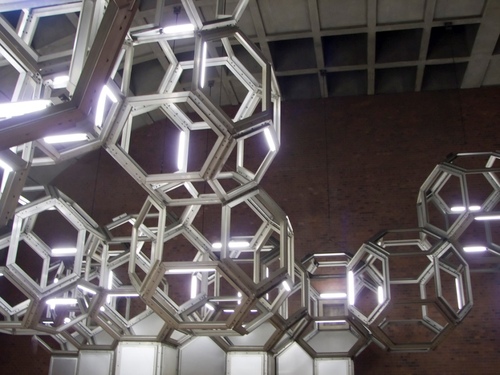Overlooked Art
Overlooked Art
by Christine
Fournier
The largest art museum in Montreal goes unnoticed by
most. In total it is 70 kilometers long and covers a large part of the city
with many exhibits by noted Quebec artists and architects. Each of its 68 "rooms"
has its unique style and flavour.
The Montreal Metro system, which is operated by the
Société
de transport de Montréal, opened on October 14, 2021
and while it is not a museum in the conventional sense of the word, the works
of art it houses number in the hundreds. There are sculptures, murals, mosaics,
stained glass and architectural elements- while some stations are the work art.
Though most art is from newer periods, think modern or pop art, certain pieces
have classical inspirations.
Around 90 artists currently have pieces for the
public to see. In some cases, artists like Frédéric
Back, Marcelle Ferron Antoine D. Lamarche, André Léonard,
Jean-Paul Mousseau, Pierre Osterrath, and Marcel Raby have works in multiple
metro stations, though the names may not be familiar to many transit users, their
pieces definitely are.
While some stations are utterly boring due to their
lack of art and rather practical but drab setting, such as Atwater, Guy-Concordia
and Longueuil--Université-de-Sherbrooke. The
Jolicoeur station seems to be from another era, having never left its vintage feel
behind while LaSalle, one of the best stations for architecture lovers, is a
concrete abstract sculpture that has a metro running through it. De la Concorde
and Place-Saint-Henri follow this trend but are modern marvels with splashes of
colour, columns and pattern. Another noteworthy station is De la Savanne, with
its angular features and funky light fixtures that look like an extreme version
of sugar crystals.
For those interested in murals and mosaics, Assomption,
Crémazie,
De Castelnau, D'Iberville, Snowdon, Université-de-Montréal
and Viau stations are worth a visit. Villa-Maria has what appears to be a Pac
Man-inspired piece by André Léonard
entitled Circles. The mural at
Papineau is a wonderful piece by Jean Cartier and George Juhasz entitled Les Patriotes de 1837-1838. While the works
at the Pie-IX station are Olympic-themed. For those who love modern, pop or
abstract art, beautiful tile mosaics can be found at Cadillac, Henri-Bourassa and Jean-Talon. The most known are probably
those at Peel, whose circles of colourful tiles are courtesy of Jean-Paul
Mousseau.
photo by Ryan Lee
Sculptures are also quite prevalent. Berri-UQAM,
Cartier, Côte-des-Neiges, Georges-Vanier as well as Monk have
some nice ones, while Namur features a suspended, molecular-like piece that
appears to belong in a science classroom rather than metro station. The tree with
faces found at Lionel-Groulx can seem a little creepy the piece is called L'Arbre de vie (The Tree of Life)
by Joseph Rifesser and was donated by the United Nations. Germain Bergeron's
Pic et Pelle at the Monk station looks
like two twig insects hard at work.
The stained glass works are probably amongst the
most beautiful pieces. Champ-de-Mars, Charlevoix and Du Collège
have nice pieces, but nothing as spectacular as those found in three other
stations, which pay tributes to the history of Montreal. Berri-UQAM has
gorgeous modern pieces dedicated to the city's
founders and was created by Pierre Gaboriau and Pierre Osterrath, while
Place-des-Arts' mural by Frédéric
Back showcases Montreal's music scene. The best may be
the five piece series, a tribute to life in Montreal in the 19th century by
Nicolas Sollogoub at the McGill station.
While all the above mentioned art can be found below
city streets that is not to say that none can be found above ground. Square-Victoria
has a beautiful Art Nouveau metro entrance designed by Hector Guimard, and was donated
to us by the city of Paris. The Parc station is an old train terminal whose
beauty can only be appreciate from outside. Jean-Drapeau and Cartier have
outdoor sculptures that deserve a look as well.
The cost to ride the metro is $2.75 for a single
fare, though many of pieces mentioned are located past the turnstiles, so plan
to pay for multiple fares. Six tickets cost $13.25 but one- or three-day
tourists passes cost $7 and $14 respectively. All of these can be loaded onto
an OPUS card if desired. The tourist pass is available at all times from Peel,
Bonaventure and Berri-UQAM from May to November it is available at many other
stations. Consult www.stm.info for more information.
For more information on art and the history of the Montreal's metro system, visit Matt McLauchlin's site at www.metrodemontreal.com or the STM's site at www.stm.info.


Leave a comment